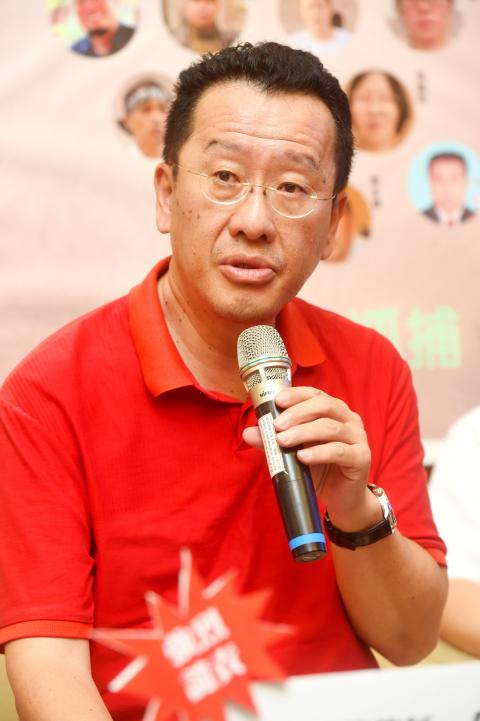Democratic Progressive Party (DPP) Legislator Wellington Koo (顧立雄) yesterday confirmed that he has agreed to head the Executive Yuan’s commission to handle the Chinese Nationalist Party’s (KMT) ill-gotten assets.
The commission is to be set up under the Act Governing the Handling of Ill-gotten Properties by Political Parties and Their Affiliate Organizations (政黨及其附隨組織不當取得財產處理條例), which was passed by the legislature late last month in a vote that was split along party lines.
According to the act, the premier is to appoint 11 to 13 members of the commission, who will be charged with investigating, retroactively confiscating and returning or restoring to rightful owners all assets that were improperly obtained by the KMT and affiliated organizations since Aug. 15, 1945 — when Japan officially announced its surrender to the Allies, bringing World War II to an end.

Photo: Chien Jung-fong, Taipei Times
Koo said he had not anticipated the appointment and had planned to push for several judicial, narcotics and prison reform bills in the legislature, but President Tsai Ing-wen (蔡英文) and Premier Lin Chuan (林全) had expressed their wishes for him to accept it.
“I can only tell you at this time that they said I was the right man for the job. When called on to shoulder such great responsibilities, there is no room for me to say no,” he said.
A commission to deal with illegitimately obtained party properties is “crucial to transitional justice, fair play between the political parties and deepening the nation’s democratization,” he added.
Koo said that as a lawmaker, he had worked hard to help draft the ill-gotten party properties law, and the legislation and the commission tasked with implementing the law were “unprecedented challenges for which it is impossible to ask others for guidance.”
The KMT should “let go of the party assets that are a hindrance to its rebirth,” Koo said, promising to carry out his new job “correctly and within the confines of the law.”
Koo was formerly a partner at Formosa Transnational Attorneys at Law and has served as director of the Taipei Bar Association, chairman of the Judicial Reform Foundation and chairman of the Taiwan Association for Human Rights.
Sources said that the Presidential Office and the Cabinet believe that Koo’s “mastery of the law, personal integrity and work ethic” would be important qualities for overseeing the effort to recover the private and public assets that the KMT is accused of having obtained during its years of authoritarian rule in Taiwan.
Koo will have to give up his legislator-at-large seat, as the Constitution bars serving lawmakers from concurrently holding a government post.
He will be replaced by former DPP legislator Julian Kuo (郭正亮), whose name was on the DPP legislator-at-large ballot in the Jan. 16 elections immediately after Koo’s.
However, Kuo’s return to the legislature could renew questions about his arrest in February on a drunk driving charge.
Additional reporting by Yang Chun-hui and CNA

Alain Robert, known as the "French Spider-Man," praised Alex Honnold as exceptionally well-prepared after the US climber completed a free solo ascent of Taipei 101 yesterday. Robert said Honnold's ascent of the 508m-tall skyscraper in just more than one-and-a-half hours without using safety ropes or equipment was a remarkable achievement. "This is my life," he said in an interview conducted in French, adding that he liked the feeling of being "on the edge of danger." The 63-year-old Frenchman climbed Taipei 101 using ropes in December 2004, taking about four hours to reach the top. On a one-to-10 scale of difficulty, Robert said Taipei 101

Nipah virus infection is to be officially listed as a category 5 notifiable infectious disease in Taiwan in March, while clinical treatment guidelines are being formulated, the Centers for Disease Control (CDC) said yesterday. With Nipah infections being reported in other countries and considering its relatively high fatality rate, the centers on Jan. 16 announced that it would be listed as a notifiable infectious disease to bolster the nation’s systematic early warning system and increase public awareness, the CDC said. Bangladesh reported four fatal cases last year in separate districts, with three linked to raw date palm sap consumption, CDC Epidemic Intelligence

Taiwanese and US defense groups are collaborating to introduce deployable, semi-autonomous manufacturing systems for drones and components in a boost to the nation’s supply chain resilience. Taiwan’s G-Tech Optroelectronics Corp subsidiary GTOC and the US’ Aerkomm Inc on Friday announced an agreement with fellow US-based Firestorm Lab to adopt the latter’s xCell, a technology featuring 3D printers fitted in 6.1m container units. The systems enable aerial platforms and parts to be produced in high volumes from dispersed nodes capable of rapid redeployment, to minimize the risk of enemy strikes and to meet field requirements, they said. Firestorm chief technology officer Ian Muceus said

MORE FALL: An investigation into one of Xi’s key cronies, part of a broader ‘anti-corruption’ drive, indicates that he might have a deep distrust in the military, an expert said China’s latest military purge underscores systemic risks in its shift from collective leadership to sole rule under Chinese President Xi Jinping (習近平), and could disrupt its chain of command and military capabilities, a national security official said yesterday. If decisionmaking within the Chinese Communist Party has become “irrational” under one-man rule, the Taiwan Strait and the regional situation must be approached with extreme caution, given unforeseen risks, they added. The anonymous official made the remarks as China’s Central Military Commission Vice Chairman Zhang Youxia (張又俠) and Joint Staff Department Chief of Staff Liu Zhenli (劉振立) were reportedly being investigated for suspected “serious